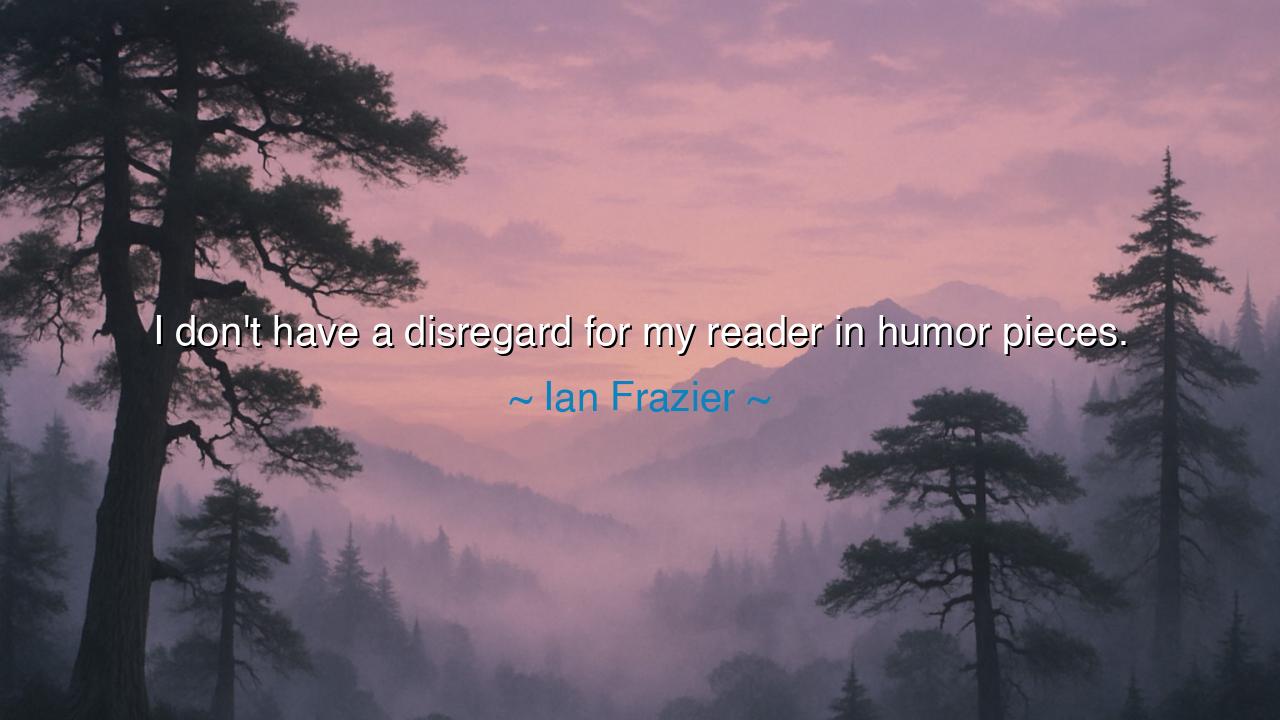
I don't have a disregard for my reader in humor pieces.






Hear the words of Ian Frazier, the quiet craftsman of wit and wisdom: “I don’t have a disregard for my reader in humor pieces.” Though simple in phrasing, this declaration holds the power of a moral creed, a torch passed down through the long tradition of storytellers, poets, and jesters. It is a reminder that humor, at its highest and most enduring form, is not cruelty masked as cleverness, nor arrogance clothed in laughter. Rather, it is an act of fellowship. The humorist who truly honors his art writes not to mock or to wound, but to connect—to share a moment of recognition with his reader, as two travelers who meet upon the same winding road of human folly.
In these words, Frazier reveals the ancient virtue of respect for the audience, a virtue older than pen or parchment. The jester of the medieval court knew it; the poet of Athens practiced it. Even the storytellers who gathered around the fires of old tribes understood it: that laughter is a sacred thread, binding speaker and listener in a shared experience of truth. To disregard the reader, to sneer from the page or wield humor as a weapon, is to break that bond. But to write with reverence for those who listen—to honor their intelligence, their hearts, and their dignity—is to step into the noble lineage of those who heal through laughter rather than divide with it.
The ancients called such balance Eutrapelia, the virtue of measured playfulness. Aristotle, in his Ethics, spoke of the person who jokes with grace—not to injure or humiliate, but to delight and instruct. For the Greeks believed that humor, rightly used, was a form of wisdom, revealing truth without bitterness. The fool who mocked others for sport was base, but the one who laughed with compassion was divine. So too does Frazier remind us that humor must be built upon empathy—that to make others laugh without cruelty is one of the highest arts of the human spirit.
Consider the example of Abraham Lincoln, a man who bore the weight of a divided nation yet carried laughter in his heart. His humor was never venomous, never made to belittle. In the darkest years of the Civil War, when despair hung like smoke over the land, Lincoln told gentle stories that lightened the hearts of those around him. A general once accused him of making jokes at an unseemly time, and Lincoln replied, “If I did not laugh, I should die.” His laughter, like Frazier’s, was rooted in care for his audience—it was a bridge, not a wall. He understood that humor, when wielded with love, is a weapon against despair, not against one another.
The origin of Frazier’s statement lies not merely in literary craft, but in moral consciousness. As a writer for The New Yorker, he stood among a lineage of humorists who saw their work as both mirror and balm. From James Thurber to E. B. White, the tradition of American humor has been one of gentle irony—exposing human absurdity while affirming the beauty of being human. Frazier’s refusal to disregard the reader springs from that lineage. He understands that the best laughter is shared, not imposed; that humor is a conversation, not a performance. In his words lives the principle that art without respect loses its soul.
To apply this wisdom in our own lives, we must learn the discipline of mindful speech. When you jest, ask yourself: “Does my laughter unite or divide? Does it open hearts or harden them?” The world is rich with cruelty disguised as humor, and it is easy to join in. Yet the wise resist the temptation to laugh at the expense of others. They choose instead the humor of empathy—the kind that reveals the absurdity of life while honoring the humanity within it. Such laughter uplifts rather than humiliates; it teaches rather than destroys.
So, let this teaching be passed down to all who speak, write, or live among others: Respect your listener. Respect your reader. Respect the soul that meets yours in laughter. For humor is not merely the seasoning of conversation—it is a sacred act of connection. When you speak in jest, speak kindly. When you write to amuse, write truthfully. And above all, as Ian Frazier teaches, never forget that those who receive your words are not targets, but companions on the same winding path of joy and error. To make another laugh without wounding them is no small thing—it is an act of grace, the mark of one who has learned that wisdom wears a smile.






AAdministratorAdministrator
Welcome, honored guests. Please leave a comment, we will respond soon